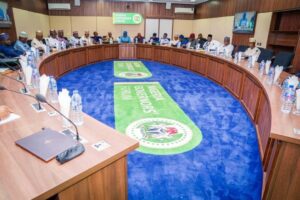
NUPRC moves to boost investments in Nigeria with automation of business processes
The Nigerian Upstream Petroleum Regulatory Commission (NUPRC) has revealed that it will be automating business processes in the oil and gas industry to boost investments inflow into the sector.
This follows the huge outflow of investments particularly in the Nigerian oil and gas industry in 2023.
Reeling out out its action plan for 2024 and near term 2024 to 2026, the NUPRC highlighted in broad terms the regulatory approach and actions that are to be implemented by the Commission in furtherance of its mandate as the apex regulatory agency established to supervise upstream petroleum operations in Nigeria.
The Regulatory Action Plan (RAP) is focused on regulatory and predictability, future licencing rounds policy and implementation, unit cost of production optimisation, automation and business process improvements for operational efficiency, promoting ease of entry and investment retention, vacating entry barriers associated with huge asset acquisition fees, deepening transparency, accountability and elimination of discriminatory regulatory practices, implementation of a carbon credit earnings framework for upstream operations, accelerating the execution of oil and gas development and production projects, and enforcement of Drill or Drop provisions of the Petroleum Industry Act (2021).
Other areas of focus include the optimisation of federation revenues, decarbonisation and greenhouse gas (GHG) emissions management in producing environment and Incorporation of green story in FDPs, diligent monitoring of implementation of the Nigerian Gas Flare Commercialisation Programme (NGFCP) awarded sites for optimum flare-out monetisation, Host Community Trust Fund implementation and guiding the trust fund activities to reduce agitation in the operations areas and 100 percent hydrocarbon accounting.
The RAP also targets the implementation of the new production curtailment regime and domestic crude supply obligation, annual asset performance assessment and reviews, enforcement of Domestic Crude Supply Obligation (DCSO) and Domestic Gas Distribution Obligation (DGDO) to improve domestic refining capacity, implementation of frontier exploration fund, decommissioning and abandonment (D&A) fund, zero tolerance to default in royalty payment, value creation through approval of annual work programme/budget and monitoring of financial viability, crude oil and gas pricing in contemporary terms, and revenue generation and implementation of zero default strategy on payment of royalty.
The Commission Chief Executive (CCE), Engr. Gbenga Komolafe in a statement issued in Abuja indicated that the foregoing represents in broad terms the key thematic focus areas that would underpin the Commission’s activities in 2004.
“These are in addition to the Commission’s commitment to its general objectives and functions as provided in the PIA and by implication all other laws relating to upstream petroleum operations in Nigeria.”
Engr. Komolafe stated that in focusing on these areas, the Commission aims to bring into rapid effect the transformation of the sector envisaged by the PIA (2021) and ramp up the efficiency and performance of the Sector.
He was optimistic that the implementation of these initiatives would in the short- and long-term increase revenues generated for the Government from the industry, improve the regulatory and operating environment, optimise value, generate jobs, and position the country as a destination for foreign direct investment for the Sector.
The CCE noted that as a strategy-driven organisation, the NUPRC is firmly committed to setting a clear agenda for the Nigerian upstream sector to engender efficiency and effectiveness in line with the PIA and government aspirations for a virile, functional and profitable oil and gas sector.
“The Commission will ensure that the RAP for 2024 and the near term is implemented vigorously by all concerned in the beneficial interest of operators, service providers, industry participants and other stakeholders, all in the overriding national interest.”
Giving an insight into why the Commission is focusing on the thematic areas, the CCE explained that the public policy statement is issued within the context of the global energy landscape which is currently in a state of rapid change in response to climate concerns and the challenges faced by the fossil fuel industry and economies long dependent on it.
“These challenges include climate change issue, the energy transition momentum, and the drive towards net zero emissions by the international comity of nations in such Forums such as the recently concluded United Nations Conference of Parties (COP) 28 conference in Dubai, United Arab Emirates, and such other international forums before it.”
Engr. Komolafe pointed out that Nigeria’s position on energy transition aligns with that of OPEC in the call for just, inclusive, equitable and balanced energy transitions.
“In the words of His Excellency, Bola Tinubu, at the United Nations General Assembly (UNGA) in September 2023, Mr. President underscored the fact that ‘African nations will fight climate change, but we must do so on fair and just terms (and) must accord with our overall economic efforts;” a position echoed by other world leaders at UNGA and similar gathering during 2023.
He further explained that the Agenda for Nigeria, Africa, and other resource-rich developing economies is that the evolving energy dynamics must be calibrated against geography, history, and politics as well as the need for energy justice, equity, inclusivity, and sustainability.



